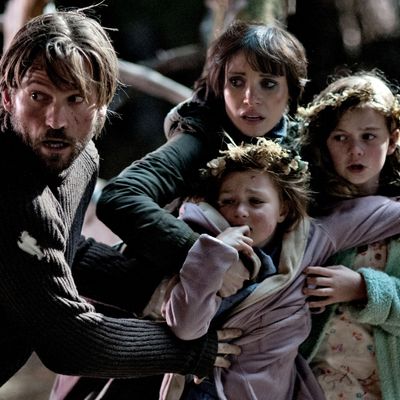
As a horror enthusiast weaned on the classics of Universal and Hammer as well as far more disreputable producers, I’ve been dismayed at how the genre has gone to the dogs — and the mindless zombies, motiveless poltergeists, and indestructible psycho killers in remakes nobody needs. I’m sick of all the unhappy endings with their nihilist final shots confirming that evil can never be put down — partly because a lot of people no longer buy the idea of closure in our senselessly violent culture, mostly because studios need their demons evergreen for those cheap, income-generating horror “franchises.” I’ve started to avoid horror movies — my life’s blood.
But I got a healthful transfusion from Mama, directed by first-timer Andrés (Andy) Muschietti and produced by lifelong genre freak Guillermo del Toro. The plotting isn’t fresh, and the politics are a tad reactionary, but the movie is also shapely, rounded, satisfying — a classical ghost story. It ends with a heartrending primal trauma, and yet it has the sort of closure you don’t see anymore in horror pictures. You’re left with more than the feeling that you’ve been mugged.
Del Toro gravitates to fairy tales of imperiled children torn between good and evil guardians — and often torn apart by the process. At the center of Mama are two little blonde sisters, the watchful Victoria (Megan Charpentier) and the wee imp Lilly (Isabelle Nélisse). In the tumultuous prologue, they’re kidnapped by their crazed father — he has just shot their mother — and on the verge of being murdered in an abandoned house in the middle of a snowbound forest when … Well, what happens is in one way very, very good and in another very, very bad. Which is an excellent way to start a horror film. Our sympathies are confounded.
Five years on, the girls are discovered in that cabin by trackers hired by their uncle, Lucas (Nikolaj Coster-Waldau), and are, at first, barely recognizable as human. (CGI helps.) They hiss and claw and scamper around on all fours. Lilly was barely a toddler when she entered that cabin and is particularly far gone. Whisked away, she calls out, “Mama.”
Uncle Lucas is the male hero, but he’s sidelined for most of the picture. It’s his live-in girlfriend, Annabel, who’s the protagonist. She’s played by Jessica Chastain, hair cut sharp and died raven-black, her eyes rimmed with mascara. Apart from her bone structure and that dimpled chin, you can barely recognize Chastain from — well, any of her eight or nine parts in the last two years (which is presumably why she took the role, to show off her Streepishness). Annabel is a Goth rocker who doesn’t want kids, which we know because in her first scene she takes a pregnancy test and exhales with relief when it’s negative (a little on-the-nose, but the plot point registers). It’s quite a challenge for Annabel to care for two feral girls at the behest of a hovering therapist (Daniel Kash) who thinks that the kids belong not in a hospital (or, in the case of the younger, a zoo) but a stable, sweet home. His institute even supplies one — a big suburban house with plenty of closet space for demons.
What’s obvious from the first few scenes is that Mama will come down to whether Annabel will selfishly desert these girls or bond with them and, in the process, discover her own maternal instincts — the only effective weapon against the title character. This is the kind of conservative, moralistic theme (independent women aren’t natural) that has given horror pictures a bad rep among university genre scholars. But I’m bound to say, without spoiling anything, that the movie’s example of a devoted mother is a lot more terrifying. The title character is, as I’m pretty sure you know, a ghost, and one of modern cinema’s eeriest, a spidery thing with a face that’s a dry-rotted mask of pain and rage. She looks too unnatural to be anything other than CGI, but apparently she’s (mostly) flesh and blood, embodied by an actor named Javier Boutet with something called Marfan syndrome that allows him to dislocate all of his joints. I know: Ew.
As in most modern horror films, too many of Mama’s scares come with a fortissimo orchestral “Boo!” to make you jump. But others owe their power to Muschietti’s fluid staging and knack for putting Mama in the part of the frame where you least expect her. Fernando Velazquez’s deliciously hammy music helps: First growly and foreboding, it can swell to gratifying heights, with vocals that sound like a chorus of children in a sepulcher. The music accompanies swirling, swooping, eye-popping expressionist dream sequences — visions, really, telepathically induced by this jealous and very volatile spirit for reasons that aren’t dramatically clear. (Why would she be telling her story to Annabel, whom she’s trying to kill?) But I like the look of those sequences too much to complain.
The most wrenching question in Mama turns out to be not whether Annabel can be a mom but whether either or both of these little girls will have the emotional capacity (and smarts) to forsake a steadfast but demonic psycho mama for one who might be less constant but won’t suck out anyone’s innards. I was guessing right till the bitter, scary, transcendent end. Another thing I loved: There’s no sequel in sight.





